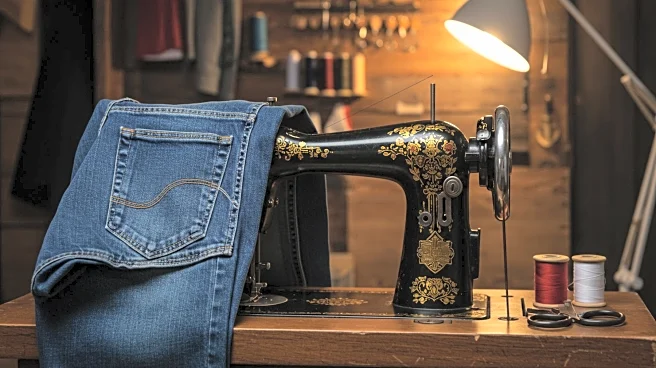What is the story about?
What's Happening?
Round House Jeans, a longstanding denim manufacturer in Shawnee, Oklahoma, is facing challenges in maintaining profitability while producing American-made jeans. Founded in 1903, the company prides itself on using 100% American cotton and employing local workers to create its products. Despite the 'Made in USA' label, the company experiences razor-thin profit margins, with Vice President David Antosh revealing that the jeans are sold at a 5% margin or less. The company also faces difficulties in recruiting skilled workers, as the U.S. apparel industry has significantly declined, leaving a shortage of experienced personnel. To sustain operations, Round House also sells jeans made in Bangladesh, which offer higher profit margins and help subsidize the cost of American-made jeans.
Why It's Important?
The situation at Round House Jeans highlights the broader challenges faced by U.S. manufacturers in the apparel industry. Despite efforts to promote domestic production, including tariffs aimed at reshoring manufacturing, companies like Round House struggle with high production costs and limited skilled labor. This case underscores the difficulty of competing with overseas production, which remains cheaper and more efficient. The company's experience reflects the broader economic implications of 'America first' policies, as domestic manufacturing faces hurdles in terms of cost, capacity, and technology. The decline in U.S. apparel manufacturing also impacts employment opportunities and the sustainability of local economies.
What's Next?
Round House Jeans must navigate the complexities of maintaining its American manufacturing operations while balancing profitability. The company may need to explore strategies to enhance workforce training and retention, as well as consider potential price adjustments to remain competitive. Additionally, the impact of tariffs on imported goods could influence future business decisions, as higher costs may affect the affordability of American-made products. The broader industry may continue to seek diversification in sourcing to mitigate tariff effects, potentially leading to shifts in manufacturing strategies.
Beyond the Headlines
The challenges faced by Round House Jeans also raise questions about the long-term viability of American apparel manufacturing. The company's commitment to preserving its heritage and supporting local jobs reflects a cultural and ethical dimension that goes beyond profit maximization. This situation may prompt discussions on the need for policy interventions to support domestic manufacturing, including investments in technology and workforce development. The case also highlights the potential for innovation in sustainable and ethical production practices within the U.S. apparel industry.
















